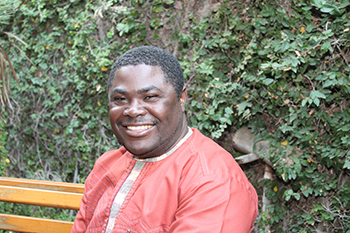Latest News Archive
Please select Category, Year, and then Month to display items
05 June 2018
Photo Supplied
 Archaeological excavations in the Wonderwerk Cave, north of Kuruman in the Northern Cape.
Archaeological excavations in the Wonderwerk Cave, north of Kuruman in the Northern Cape.
Research fellow Dr Lloyd Rossouw from the Department of Plant Sciences at the University of the Free State (UFS) recently published an article in the Nature Ecology and Evolution journal with Dr Michaela Ecker from the University of Toronto as lead author, and Dr James Brink, research fellow at the UFS Centre for Environmental Management. The findings described in “The palaeoecological context of the Oldowan-Acheulean in southern Africa” provides the first extensive paleoenvironmental sequence for the interior of southern Africa by applying a combination of methods for environmental reconstruction at Wonderwerk Cave, which have yielded multiple evidence of early human occupation dating back almost two million years ago.
Where water once was
The Wonderwerk Cave is found north of the Kuruman hills (situated in Northern Cape) a 140m long tube with a low ceiling. The surroundings are harsh. Semi-arid conditions allow for the survival of only hardy bushes, trees, and grasses. But during the Early Pleistocene, stepping out of the Wonderwerk Cave you would have been greeted by a completely different site, the researchers found. Using carbon and oxygen stable isotope analysis on the teeth of herbivores (Dr Ecker), fossil faunal abundance (Dr Brink), as well as the analysis of microscopic plant silica remains (phytoliths) excavated from fossil soils inside the cave (Dr Rossouw), the results show that ancient environments in the central interior of southern Africa were significantly wetter and housed a plant community unlike any other in the modern African savanna.
What difference does it make?
While East African research shows increasing aridity and the spread of summer-rainfall grasslands more than a million years ago, the results from this study indicate an interesting twist. During the same period, shifts in rainfall seasonality allowed for alternating summer and winter-rainfall grass occurrences coupled with prolonged wetlands, that remained major components of Early Pleistocene (more or less the period between one and two million years ago) environments in the central interior of southern Africa. That means our human ancestors were also living and evolving in environments other than the generally accepted open, arid grassland model.
UFS mathematician rates as top reviewer
2017-09-27

Prof Abdon Atangana is a professor at the
Institute for Groundwater Studies at the University
of the Free State.
Photo: Rulanzen Martin
South Africa was included in the top 30 countries in terms of researchers who added the most pre-publication peer reviews.
Prof Abdon Atangana, a professor of Applied Mathematics at the Institute for Groundwater Studies at the University of the Free State (UFS), is included in the list of top reviewers from top countries, as determined by the number of verified pre-publication peer reviews added to Publons for Publons Peer Review Awards 2017.
Producing the most verified peer reviews
He rated in the top 1% of reviewers (9th), in all fields, who performed the most verified pre-publication peer reviews at Publons for Publons Peer Review Awards 2017. In 2017 he also received the following awards:
- Top reviewers for UFS in the category Mathematics, rating in eighth place. In this category Stanford University rated second. Rating in ninth place is the University of Luxembourg.
- Top reviewers for Mathematics (rating 1st). In this category the Southern Illinois University and the Johns Hopkins University in the US rated in 27th and 25th place respectively.
- Top reviewers for Engineering (rating 47th)
Prof Atangana’s research interests are methods and applications of partial and ordinary differential equations, fractional differential equations, perturbation methods, asymptotic methods, iterative methods, and groundwater modelling.
Passion for the development of science
Key to his success as peer reviewer is his passion for the development of science, his ability to write fair reports about a given manuscript, as well as his knowledge of what has been done and what the challenges are in a given field to be able to give a report that will help the advancement of science.
“Due to the impact of my research papers in the field of mathematics and applied mathematics and also my international recognition in the field of applied mathematics, many editors in more than 100 journals of applied mathematics trust my opinion to assess whether a submitted paper in a given journal of mathematics and applied mathematics can be published or not,” said Prof Atangana.